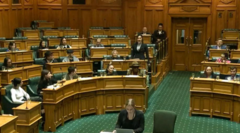The National Assembly's approval of the assisted dying bill aims to provide options for those suffering from incurable illnesses while balancing ethical concerns around vulnerable populations.
**France Takes Significant Step Toward Legalizing Assisted Dying**

**France Takes Significant Step Toward Legalizing Assisted Dying**
French lawmakers vote in favor of a bill that could allow assisted dying for terminally ill patients, sparking a wide-ranging debate on ethics and patient care.
In a historic move, French MPs have endorsed a legislation aimed at allowing assisted dying for individuals suffering from terminal illnesses. The National Assembly voted 305 to 199 in favor of the bill, which enjoys the support of President Emmanuel Macron. This pivotal decision will now proceed to the Senate for further consideration before returning to the National Assembly for a final review, with hopes for its enactment by 2027. If passed, France will become the eighth nation within the European Union to authorize some form of assisted dying.
The proposed legislation stipulates that only individuals diagnosed with a "serious and incurable disease" in advanced or terminal phases, who are experiencing continuous physical or psychological suffering, would qualify for assisted dying. Patients must express their intention clearly, wait 48 hours, and reaffirm their decision before proceeding. If they choose to go ahead, the lethal dose would be self-administered or provided by a medical professional in case the patient lacks the capability.
This controversial initiative spurred intensive debates over the criteria for eligibility, highlighting differing views on moral and ethical standpoints. While the bill garnered support predominantly from the center and left, resistance emerged from conservative factions and the populist right, reflecting deep societal divides on this sensitive issue. Critics, including traditionalist voices inspired by the Catholic Church's teachings, fear that the bill's vague definitions could lead to misuse and pressure on vulnerable individuals—particularly the elderly—who may feel compelled to seek assisted dying to alleviate their families’ burdens.
In contrast, advocates argue the need for law changes, citing that nearly half of French patients requiring palliative care do not receive it. In an additional notable development, a separate bill aimed at enhancing patients' rights to palliative care passed without opposition, pointing to an urgent need for comprehensive support for those facing terminal conditions.
The debate surrounding assisted dying continues to capture public attention, as some call for broadening eligibility to include minors and individuals who preemptively express their wishes regarding end-of-life care. Meanwhile, provisions within the bill ensure that healthcare providers opposed to assisted dying are not mandated to perform the procedure, although attempts to impede its implementation could incur legal penalties.
With the discourse around assisted dying unfolding both inside legislative chambers and in society at large, French citizens remain divided yet engaged on an issue that strikes at the core of personal autonomy, dignity, and ethical medical practices.
The proposed legislation stipulates that only individuals diagnosed with a "serious and incurable disease" in advanced or terminal phases, who are experiencing continuous physical or psychological suffering, would qualify for assisted dying. Patients must express their intention clearly, wait 48 hours, and reaffirm their decision before proceeding. If they choose to go ahead, the lethal dose would be self-administered or provided by a medical professional in case the patient lacks the capability.
This controversial initiative spurred intensive debates over the criteria for eligibility, highlighting differing views on moral and ethical standpoints. While the bill garnered support predominantly from the center and left, resistance emerged from conservative factions and the populist right, reflecting deep societal divides on this sensitive issue. Critics, including traditionalist voices inspired by the Catholic Church's teachings, fear that the bill's vague definitions could lead to misuse and pressure on vulnerable individuals—particularly the elderly—who may feel compelled to seek assisted dying to alleviate their families’ burdens.
In contrast, advocates argue the need for law changes, citing that nearly half of French patients requiring palliative care do not receive it. In an additional notable development, a separate bill aimed at enhancing patients' rights to palliative care passed without opposition, pointing to an urgent need for comprehensive support for those facing terminal conditions.
The debate surrounding assisted dying continues to capture public attention, as some call for broadening eligibility to include minors and individuals who preemptively express their wishes regarding end-of-life care. Meanwhile, provisions within the bill ensure that healthcare providers opposed to assisted dying are not mandated to perform the procedure, although attempts to impede its implementation could incur legal penalties.
With the discourse around assisted dying unfolding both inside legislative chambers and in society at large, French citizens remain divided yet engaged on an issue that strikes at the core of personal autonomy, dignity, and ethical medical practices.






















